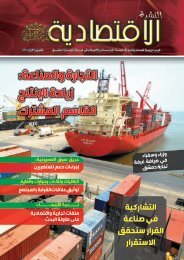SIGAR
2017-01-30qr
2017-01-30qr
You also want an ePaper? Increase the reach of your titles
YUMPU automatically turns print PDFs into web optimized ePapers that Google loves.
ECONOMIC AND SOCIAL DEVELOPMENT<br />
quarter, but a joint work plan was to be finalized by OTA leadership and<br />
Minister of Finance Hakimi in December 2016.<br />
• Economic crimes: developing the capacity and effectiveness of<br />
Afghanistan’s financial-intelligence unit and evaluating the central<br />
bank’s capability to supervise money-service providers for compliance<br />
with measures against money laundering and terror financing. An initial<br />
assessment mission took place in March 2015, but technical assistance<br />
has not yet begun. OTA plans on-site evaluations of these Afghan<br />
entities and subsequent assistance to strengthen analytic capacities,<br />
standard operating procedures, and outreach to stakeholders.<br />
• Banking: electronic reporting and risk management, and state-bank<br />
restructuring (this assistance can be provided from the U.S. Embassy-<br />
Kabul and remotely). The assessment mission of September 2015 has<br />
not yet been followed by technical assistance.<br />
• Revenue: collaborating with the new customs and tax academy in<br />
curriculum design, course delivery, and supplying course materials. An<br />
assessment mission took place in March 2016; technical assistance has<br />
not yet begun.<br />
OTA has carried out six program-assessment missions to Afghanistan, but has been unable<br />
to conduct any new missions since March 2016 due to security concerns. OTA assistance to<br />
the MOF since then has been carried out remotely. Treasury reported that security conditions<br />
continue to be a major constraint on establishing a more sustained presence in Afghanistan.<br />
However, once security conditions in Afghanistan allow OTA to reengage in-country, Treasury said<br />
the ultimate effectiveness of their efforts will largely depend on a strong and sustained political<br />
commitment to reform by those Afghan government entities responsible for public financial<br />
management, financial-sector strength, and oversight.<br />
Source: Treasury, response to <strong>SIGAR</strong> data calls, 4/5/2016, 6/29/2016, 9/27/2016, and 12/30/2016.<br />
Afghanistan Public Financial Management Assistance<br />
USAID’s three-year, $22 million, Afghanistan Public Financial Management<br />
(APFM) program is the United States’ principal off-budget effort to help<br />
strengthen the Afghan government’s ability to generate and collect domestic<br />
revenue, manage its budget, and become more fiscally sustainable.<br />
The program aims to build the government’s capacity for forecasting<br />
revenue, increasing payment compliance, collection, and transfers to the<br />
treasury, as well as budget planning, execution, monitoring, reporting,<br />
and coordination. 650<br />
This quarter, APFM provided training to Afghanistan’s revenue department<br />
in tax-dispute resolution, and to the MOF budget directorate in<br />
government-finance statistics and classification of government functions.<br />
APFM began a quantitative assessment of the socioeconomic impact of<br />
proposed amendments to the income-tax law, and continued its efforts to<br />
REPORT TO THE UNITED STATES CONGRESS I JANUARY 30, 2017<br />
161







